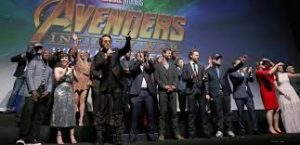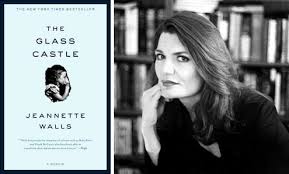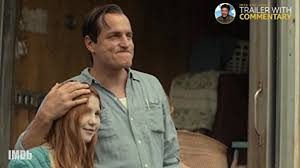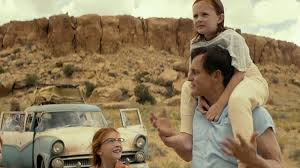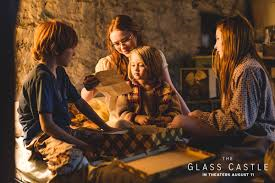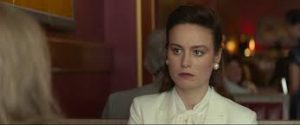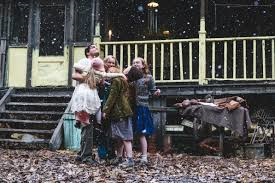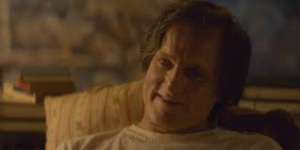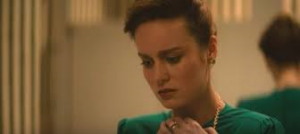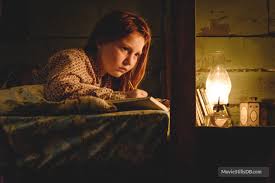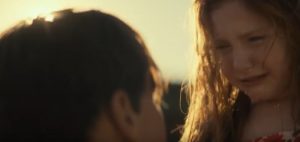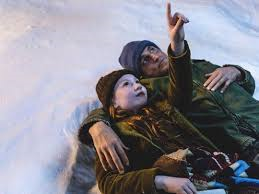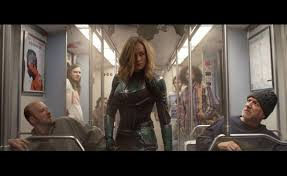
SHORT TAKE: Latest and fun addition to the Marvel Universe of super heroes and the bridge between Avengers: Infinity War and Endgame, Captain Marvel is a super hero who just happens to be a female, re-discovering her real identity while meeting Young Nick Fury and Young Phil Coulson.
WHO SHOULD GO:
Family friendly: Young teens and up should be fine, perhaps even middle schoolers with parental discretion. A handful of mild profanities but otherwise pretty clean. The violence, albeit mostly cartoonish, one alien autopsy, and threats to a family with small children might upset the littler members of the family depending on disposition.
LONG TAKE:
 Mark Twain is incorrectly thought to have said: “The rumors of my death have been greatly exaggerated.” But much like Rick’s famous misquote from Casablanca: “Play It Again, Sam” or Jimmy Cagney’s “Top of the world, Ma!” or Oliver Hardy’s “Another fine mess you’ve gotten me into,” while close, are famously – not… quite… accurate. It just goes to show how persistent mistakes can be carried on into posterity if quoted often enough.
Mark Twain is incorrectly thought to have said: “The rumors of my death have been greatly exaggerated.” But much like Rick’s famous misquote from Casablanca: “Play It Again, Sam” or Jimmy Cagney’s “Top of the world, Ma!” or Oliver Hardy’s “Another fine mess you’ve gotten me into,” while close, are famously – not… quite… accurate. It just goes to show how persistent mistakes can be carried on into posterity if quoted often enough.
And just so, I had read in a number of early pre-opening screening reviews that Captain Marvel was rife with promotions of feminist propaganda and an anti-male manifesto. After watching the movie I discovered all this hype to be wrong. 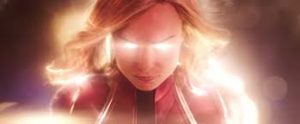 On the contrary I found Captain Marvel quite charming, a fitting addition to the Marvel superhero universe, and most importantly – FUN. Not at all the feminist manifesto it was touted to be.
On the contrary I found Captain Marvel quite charming, a fitting addition to the Marvel superhero universe, and most importantly – FUN. Not at all the feminist manifesto it was touted to be.
However, I understand how the misunderstanding arose. For example, what some people, women in particular, perceived as examples of women being treated with negative bias in the military, I saw as the quite natural hazing common to ALL military newbies.
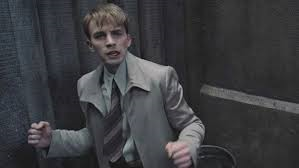 If you remember back to Captain America, Steve Rogers pre-superhero serum, was the butt of a lot of disrespect in both civilian life as well as boot camp. No one at the time complained that it was an example of discrimination against slightly built men, but appropriately just defined his backstory and provided a dramatic comparison for
If you remember back to Captain America, Steve Rogers pre-superhero serum, was the butt of a lot of disrespect in both civilian life as well as boot camp. No one at the time complained that it was an example of discrimination against slightly built men, but appropriately just defined his backstory and provided a dramatic comparison for 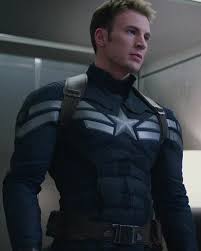 Steve Rogers’ transformation, as well as defining his character traits of courage, persistence and dignity in the face of adversity.
Steve Rogers’ transformation, as well as defining his character traits of courage, persistence and dignity in the face of adversity.
 Similarly, Carol Danvers, aka Vers aka Captain Marvel, like any other human, faces obstacles specific to her background and physique before she can become the hero that is needed.
Similarly, Carol Danvers, aka Vers aka Captain Marvel, like any other human, faces obstacles specific to her background and physique before she can become the hero that is needed.  Everyone has limitations as well as challenges they must overcome to achieve their goals and dreams. For reviewers to see logical challenges in the very competitive field of Air Force pilot training as discrimination is to have a ridiculous prejudice against men and a foolish bias in favor of women, which assumes that no woman should fail just because she’s a woman. That is inherently stupid. And it’s all just throwaway McGuffin background anyway.
Everyone has limitations as well as challenges they must overcome to achieve their goals and dreams. For reviewers to see logical challenges in the very competitive field of Air Force pilot training as discrimination is to have a ridiculous prejudice against men and a foolish bias in favor of women, which assumes that no woman should fail just because she’s a woman. That is inherently stupid. And it’s all just throwaway McGuffin background anyway.
Where did the feminist rumor come from? Like most rumors – from half truths. It is true that Brie Larson made some rather blunt and rude comments about white male reviewers. 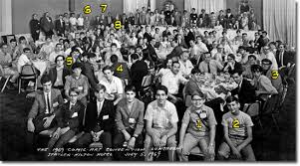 Personally I wouldn’t take offense were the playing field equal and white men were allowed to make similar comments about women. Her dismissive comment that she is not interested in hearing what a white male has to say about a movie with a female lead does not bother me half so much as the thought that if a white male said something in reverse he would be eviscerated. Can you imagine someone getting away with saying they are not interested in hearing what a minority woman has to say about Justice League since there were no minority women in the lead roles? The liberals would have lost they’re narrow little minds. Yet Brie Larson is lauded for her equally offensive remark. The inequity truly rankles the reasonable mind. How about: I’m not interested in what a woman has to say about 12 Strong because there were no women in the lead roles? Or I’m not interested in what an Eskimo has to say about West Side Story? Or ANYONE other than a white middle class male has to say about Castaway because Tom Hanks was just about the only one IN the movie? You see how ridiculous this liberal, politically correct, so-called “mentality” quickly becomes?
Personally I wouldn’t take offense were the playing field equal and white men were allowed to make similar comments about women. Her dismissive comment that she is not interested in hearing what a white male has to say about a movie with a female lead does not bother me half so much as the thought that if a white male said something in reverse he would be eviscerated. Can you imagine someone getting away with saying they are not interested in hearing what a minority woman has to say about Justice League since there were no minority women in the lead roles? The liberals would have lost they’re narrow little minds. Yet Brie Larson is lauded for her equally offensive remark. The inequity truly rankles the reasonable mind. How about: I’m not interested in what a woman has to say about 12 Strong because there were no women in the lead roles? Or I’m not interested in what an Eskimo has to say about West Side Story? Or ANYONE other than a white middle class male has to say about Castaway because Tom Hanks was just about the only one IN the movie? You see how ridiculous this liberal, politically correct, so-called “mentality” quickly becomes?
Larson simply expressed herself boorishly in voicing a reasonable desire to include a more interesting combination of reporters, like: the disabled, women, and minorities. I only wish she’d included homeschoolers, and faith-based reporters. But, of course, good luck with that one.
Regardless of all that CAPTAIN MARVEL IS A GOOD MOVIE.
BEYOND HERE BE SPOILERS – BE WARNED
Captain Marvel is about a military pilot, Carol Danvers (Brie Larson who knocked it out of the ball park in 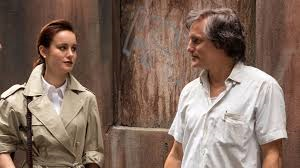 The Glass Castle – see my post here) who mysteriously ends up believing she is a member of an alien race’s warrior class, fighting the Skrulls, a race of extremely dangerous shape shifters who threaten the Universe in general and Earth in particular. On an investigative mission she winds up on Earth, meets a young, two-eyed Nick Fury and starts unraveling the mystery of her past.
The Glass Castle – see my post here) who mysteriously ends up believing she is a member of an alien race’s warrior class, fighting the Skrulls, a race of extremely dangerous shape shifters who threaten the Universe in general and Earth in particular. On an investigative mission she winds up on Earth, meets a young, two-eyed Nick Fury and starts unraveling the mystery of her past.
Captain Marvel was co-directed by the established team of Anna Boden and Ryan Fleck, who, up to now, have done Sundance award winning shorts and indies. They were chosen because of their insightful enthusiasm for the character of Carol Danvers. The duo have created a very solid and entertaining bridge between the two Avengers movies.
The CGI was interesting but, possibly deliberately, of checkerboard quality. 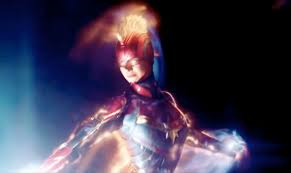 Danvers in full bore Captain Marvel mode looked a bit like a highly rendered cartoon – a nice homage, I thought, to her comic book origins.
Danvers in full bore Captain Marvel mode looked a bit like a highly rendered cartoon – a nice homage, I thought, to her comic book origins.
 As to the youthened Samuel L Jackson’s Nick Fury, either Jackson has a picture of Dorian Gray tucked somewhere in his attic or they did a masterful job with the special effects. Jackson looks legitimately 20 years younger in the movie.
As to the youthened Samuel L Jackson’s Nick Fury, either Jackson has a picture of Dorian Gray tucked somewhere in his attic or they did a masterful job with the special effects. Jackson looks legitimately 20 years younger in the movie. 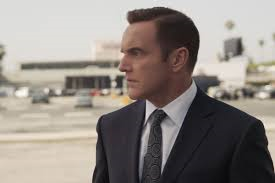 Unfortunately, the same cannot be said for Clark Gregg, whose younger Phil Coulson looked like a creepy, unnaturally smooth-faced caricature. Even were this choice purposeful due to the nature of the Skrulls and the part they play, other Skrull “imitations” looked far more natural and, assuredly, Fury would have picked up on it far before he did.
Unfortunately, the same cannot be said for Clark Gregg, whose younger Phil Coulson looked like a creepy, unnaturally smooth-faced caricature. Even were this choice purposeful due to the nature of the Skrulls and the part they play, other Skrull “imitations” looked far more natural and, assuredly, Fury would have picked up on it far before he did.
Ben Mendelsohn plays Talos, a Skrull adversary. Mendelsohn usually plays flat, two-dimensional bad guys, like 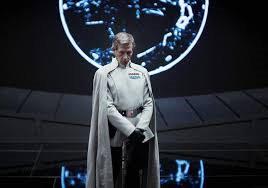 the evil mad scientist Orson Krenic, in Star Wars: Rogue One or
the evil mad scientist Orson Krenic, in Star Wars: Rogue One or 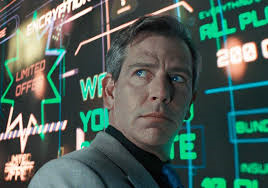 the diabolical businessman Sorento in Ready Player One.
the diabolical businessman Sorento in Ready Player One.  Mendelsohn’s Talos has a bit more to him, even a sense of humor, and it is nice to see Mendelsohn tackle a character with a bit more complexity.
Mendelsohn’s Talos has a bit more to him, even a sense of humor, and it is nice to see Mendelsohn tackle a character with a bit more complexity.
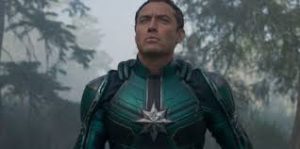 Jude Law, the third man up to bat as Dumbledore, plays Yon Rogg, Captain Marvel’s mentor.
Jude Law, the third man up to bat as Dumbledore, plays Yon Rogg, Captain Marvel’s mentor.
 Annette Benning plays both Dr. Wendy Lawson, as well as a manifestation of the Kree Supreme Artificial Intelligence, which serves as teacher to the Kree.
Annette Benning plays both Dr. Wendy Lawson, as well as a manifestation of the Kree Supreme Artificial Intelligence, which serves as teacher to the Kree.
As a side note, I thought the choice of Annette Benning in an important supporting role in a superhero movie was odd, familiar as we are with her in emotion-driven interpersonal dramas, like 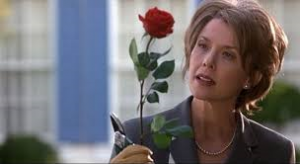 her shrewish unfaithful wife in American Beauty. Casting Benning in a major sci-fi is a peculiar fit which I am not completely sure works. She is a decent actress. She did manage
her shrewish unfaithful wife in American Beauty. Casting Benning in a major sci-fi is a peculiar fit which I am not completely sure works. She is a decent actress. She did manage 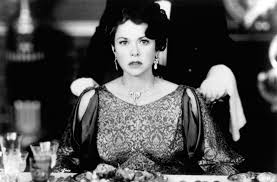 a very serviceable Queen Elizabeth in a modern rendition of Shakespeare’s Richard the Third some years ago, after all. Science fiction is just not the genre I normally associate her with. However, her screen time is fairly small, so this casting choice is not a big drawback.
a very serviceable Queen Elizabeth in a modern rendition of Shakespeare’s Richard the Third some years ago, after all. Science fiction is just not the genre I normally associate her with. However, her screen time is fairly small, so this casting choice is not a big drawback.
And then – MOST importantly – there’s Goose the cat played, depending upon the demands of the scene, by: 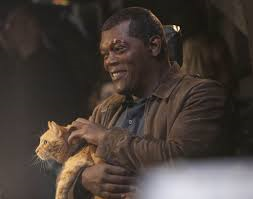
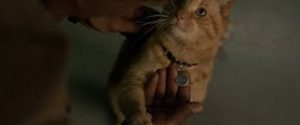
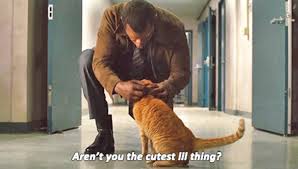
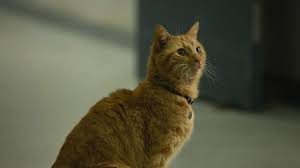 Reggie, Gonzo, Archie and Rizzo – all of whom got along famously with both Samuel L. and Ms. Larson despite the fact Jackson is self described as not a cat person and Larson is actually allergic to them. Obviously all six of them are consummate professionals. LOL
Reggie, Gonzo, Archie and Rizzo – all of whom got along famously with both Samuel L. and Ms. Larson despite the fact Jackson is self described as not a cat person and Larson is actually allergic to them. Obviously all six of them are consummate professionals. LOL
Pinar Toprak (who, with Danny Elfman, also did the soundtrack for Justice League, and has composed for other films, TV shows and video games) wrote the soundtrack, which stays in the vein of the triumphant and inspirational themes in other Avengers movies. Toprak also intersperses songs like Crazy on You by Heart, Man on the Moon by R.E.M. and Only When it Rains by Garbage, which, similar to the casting of Annette Benning, is another unusual creative choice by this film team, requiring some getting used to, but is not off putting.
In conclusion:
Is Captain Marvel a good movie and a worthy inclusion to the Marvel Universe in general and the Avengers franchise in particular? Yes.
Do I wish they had left the gender politics drivel out of the equation? Most certainly.
But when it comes to marketing, as my Dad used to say: “Say something good about me, say something bad about me, but don’t say nothing about me.” Still, someone should inform Ms. Larson that perhaps it would be sensible, if not just courteous, to avoid deliberately alienating the fundamental demographic  which has, frankly, built the financial empire of the comic book industry: THE WHITE MALE – especially since Captain Marvel was created AS a male, so the incarnation as a female is really borrowing off the male pioneered territory. She should be saying an appreciative: “Thank you,” instead of starting a snide spitting contest.
which has, frankly, built the financial empire of the comic book industry: THE WHITE MALE – especially since Captain Marvel was created AS a male, so the incarnation as a female is really borrowing off the male pioneered territory. She should be saying an appreciative: “Thank you,” instead of starting a snide spitting contest.
Most comic book hero authors were men: Stan Lee, Bob Kane, William Marston, Jerry Siegel, Bill Parker to name only a meager few.
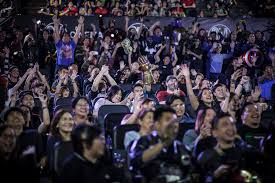 And without the WHITE TEENAGED MALES there would be no comic book industry such as it is. Up until recently the vast majority of the comic book reading/buying demographic WAS male.
And without the WHITE TEENAGED MALES there would be no comic book industry such as it is. Up until recently the vast majority of the comic book reading/buying demographic WAS male.
Am I the only one who can see that if the odds were so terribly stacked against woman, as the gender-victim baiters and pseudo politician-community agitators would have you believe, that this movie would never have been made?
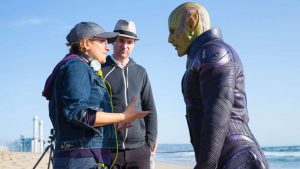 Larson should consider that she has made it to the top of what is currently considered the Hollywood Mountain. Her movie is going to make a bazillion dollars. She should learn a little etiquette and be gracious in her win.
Larson should consider that she has made it to the top of what is currently considered the Hollywood Mountain. Her movie is going to make a bazillion dollars. She should learn a little etiquette and be gracious in her win.
That being said, I DO think, thematically, it WAS a wise decision to make Captain Marvel a female, if for no other reason than there is already a VERY well established MALE super hero with a “Captain” nomenclature against which she would NOT want to compete in a popularity contest. (To paraphrase a wise Black Widow – “That’s a question she just does not need to get answered.”)
Meanwhile – I think we would all have a much better time if everyone, Miss Larson included, and perhaps especially, should just chill out.
Thankfully and ultimately, Captain Marvel is about the creation of a super hero who just happens to be a woman, NOT about the creation of an expressly female super hero.
 I must admit that a surprising homage to Stan Lee in the opening credits had me a bit choked up. Without him none of these creations: Hulk, Spiderman, Iron Man, Nick Fury, Black Widow, Ant Man, Yondu, Peggy Carter, Dr. Strange, Magneto, Loki, Ronan, Professor X, T’Chala, Groot and the plethora of others that populate most of the Marvel Universe (See the list of Stan Lee’s creations on Wikipedia here) would exists and for that we all owe Mr. Lee a tremendous debt of gratitude. I pray he finds the joy and inspiration he brought to millions while he was alive awaiting him in eternity. The film makers gave him a lovely appropriate epitaph send-off just before the opening credits to Captain Marvel, as well as a delightful posthumous cameo, almost breaking the fourth wall, in the middle of the movie. Thank you Stan, you will indeed be missed.
I must admit that a surprising homage to Stan Lee in the opening credits had me a bit choked up. Without him none of these creations: Hulk, Spiderman, Iron Man, Nick Fury, Black Widow, Ant Man, Yondu, Peggy Carter, Dr. Strange, Magneto, Loki, Ronan, Professor X, T’Chala, Groot and the plethora of others that populate most of the Marvel Universe (See the list of Stan Lee’s creations on Wikipedia here) would exists and for that we all owe Mr. Lee a tremendous debt of gratitude. I pray he finds the joy and inspiration he brought to millions while he was alive awaiting him in eternity. The film makers gave him a lovely appropriate epitaph send-off just before the opening credits to Captain Marvel, as well as a delightful posthumous cameo, almost breaking the fourth wall, in the middle of the movie. Thank you Stan, you will indeed be missed. 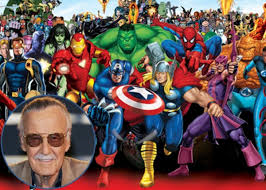
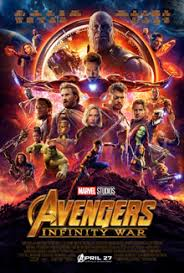 Follow up to 2018’s Avengers: Infinity War.
Follow up to 2018’s Avengers: Infinity War.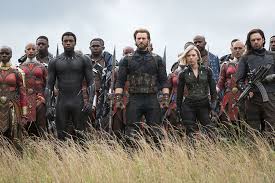 I’m NOT even using pics from Endgame but relying on images from the plethora of previous movies.
I’m NOT even using pics from Endgame but relying on images from the plethora of previous movies.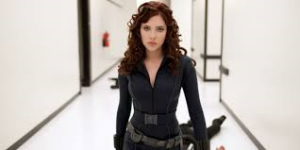 If you would NOT like spoilers let me advise you do the same – don’t watch trailers or even scan the titles to Youtubes if you would prefer to be plot-wrecking-free when you go see Endgame.
If you would NOT like spoilers let me advise you do the same – don’t watch trailers or even scan the titles to Youtubes if you would prefer to be plot-wrecking-free when you go see Endgame.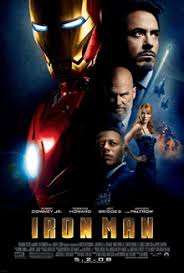 Iron Man in 2008. While you certainly could wait until it comes out on DVD, as is a surprise to no one, the cinematic spectacular is best viewed on the big screen.
Iron Man in 2008. While you certainly could wait until it comes out on DVD, as is a surprise to no one, the cinematic spectacular is best viewed on the big screen.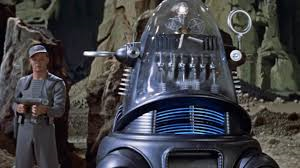 I grew up when Forbidden Planet was considered an accomplishment in 1956 and around when
I grew up when Forbidden Planet was considered an accomplishment in 1956 and around when  Star Wars knocked the socks off astonished cinema goers in 1977. So, to me, the almost infinite (excuse the pun) variety of cinematic visual tricks are amazing, gorgeous, frightening, almost overwhelming and worth the price of admission for even the three or four film attendees in the solar system I have met who are not particularly interested in the Marvel super hero plotlines.
Star Wars knocked the socks off astonished cinema goers in 1977. So, to me, the almost infinite (excuse the pun) variety of cinematic visual tricks are amazing, gorgeous, frightening, almost overwhelming and worth the price of admission for even the three or four film attendees in the solar system I have met who are not particularly interested in the Marvel super hero plotlines. Not just visually in places, but, as you can imagine with a follow up to the ending of Infinity War, there are: brutal fights, grim topics and emotionally wrenching scenes which may upset smaller children (and did in the screening I was in).
Not just visually in places, but, as you can imagine with a follow up to the ending of Infinity War, there are: brutal fights, grim topics and emotionally wrenching scenes which may upset smaller children (and did in the screening I was in). 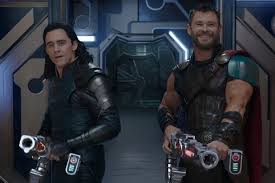 This is no light semi-parody Ragnarok with its tongue planted firmly in cheek. While the comeradic banter amongst the players is there,
This is no light semi-parody Ragnarok with its tongue planted firmly in cheek. While the comeradic banter amongst the players is there,  Endgame is obviously a sequel to the
Endgame is obviously a sequel to the  gut-wrenching, sucker-punch storyline from the previous movie, and
gut-wrenching, sucker-punch storyline from the previous movie, and  so one must be aware of the somber and anxious overall tone.
so one must be aware of the somber and anxious overall tone. Though no where near the Dead Pool level, I thought it unnecessary for a film with a demographic which should reach most age groups.
Though no where near the Dead Pool level, I thought it unnecessary for a film with a demographic which should reach most age groups.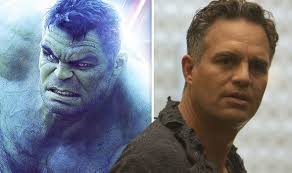 The characters in the movie continue to wear the skins of their alter egos with the same enthusiasm, affection, and insight as when we first met them.
The characters in the movie continue to wear the skins of their alter egos with the same enthusiasm, affection, and insight as when we first met them. The soundtrack by Alan Silvestri carries more variety than most Marvel movies and is a pleasure.
The soundtrack by Alan Silvestri carries more variety than most Marvel movies and is a pleasure. SO – that’s about all I can or am willing to say right now. When the time has come that the vast majority of people who want to see it HAVE seen it, I plan on a more in depth review addressing specifics. But until then –
SO – that’s about all I can or am willing to say right now. When the time has come that the vast majority of people who want to see it HAVE seen it, I plan on a more in depth review addressing specifics. But until then – 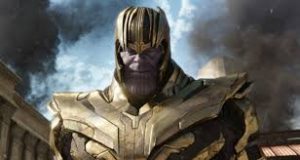 GO SEE AVENGERS: ENDGAME –
GO SEE AVENGERS: ENDGAME – 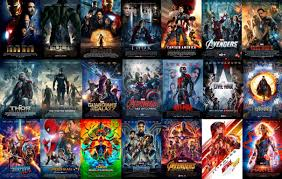 THE UNIQUE CULMINATION OF 11 YEARS IN THE MAKING OF OVER 40 SOLID HOURS OF 21 PREVIOUS MOVIES!!! BRAVO TO ALL OF THE CREATIVE TALENT WHO MADE THIS POSSIBLE AND A SPECIAL THANK YOU TO THE LATE STAN LEE.
THE UNIQUE CULMINATION OF 11 YEARS IN THE MAKING OF OVER 40 SOLID HOURS OF 21 PREVIOUS MOVIES!!! BRAVO TO ALL OF THE CREATIVE TALENT WHO MADE THIS POSSIBLE AND A SPECIAL THANK YOU TO THE LATE STAN LEE. 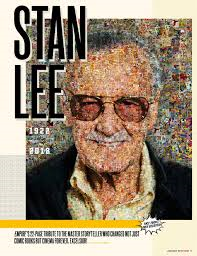 GOD BLESS.
GOD BLESS.
